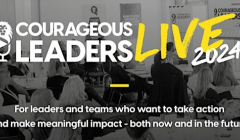
Embracing empowerment and relinquishing control
At Courageous Leaders Live 2024 leaders discuss the importance of time, feedback and making space for others

A Blind Photographer may sound bewildering, but in reality, my blindness grants me a unique photographic perspective, writes Ian Treherne

I was born profoundly deaf and, at 15, received a life-altering diagnosis of RP Ushers Syndrome Type 2. A condition which meant my sight would gradually fade. I spent the subsequent years, most of my life, trying to deny and hide my disability.
I struggled on for years. Until I couldn’t. It all got on top of me. My eyesight got worse. I lost my job when my driver’s licence was taken away, life got harder. My mental health took a downturn. I realised I had to make a decision. I had to accept my new reality as a disabled person and ‘come out of the closet’ as blind. That was the game changer.
It meant I could stop enduring difficulty, hiding and fitting into the ‘able-bodied’ world. I was going to put my creative talent and my stubbornness to use. Once I did, people took an interest in me. I’m a bit rebellious, so I did get a kick out of bending people’s minds. A blind photographer. It’s quite funny watching people get their head around that.
I’m a bit rebellious, so I did get a kick out of bending people’s minds. A blind photographer. It’s quite funny watching people get their head around that.
Ian Treherne, Photographer
I channelled my creative talent and rebellious spirit, challenging people's perceptions. A blind photographer may sound bewildering, but in reality, my blindness grants me a unique photographic perspective. With just 5% vision, I see things others might miss, relying on my senses and communication to capture the best shots.
The team at M&C Saatchi and Cabinet Office were using their initiative to think further out the box in creating a cool accessible working environment for everyone.
Ian Treherne, Photographer
When M&C Saatchi approached me to work on a new campaign aimed at challenging perceptions of disability, I immediately said yes. I resonated with the concept, eager to break barriers and challenge stereotypes.
The campaign, "Ask, Don't Assume", aims to empower the public to be allies to disabled individuals. Prominent disability influencers like Claire Sisk, Ashley Archer, Catrin Pugh and Niall Aslam actively shaped the campaign and are featured in its ads, alongside thought-provoking slogans that they co-created. The campaign's central message is to raise awareness about the common misconceptions faced by disabled people, encouraging people to ask rather than assume how they can help.
It was a really fun shoot throughout the day, and what was noticeable personally for me was that the team at M&C Saatchi and Cabinet Office were using their initiative to think further out the box in creating a cool accessible working environment for everyone, which was a refreshing change, as the Disabled Community have had to always fit into mainstream society that hasn’t included them. This was a huge step forward and proved it is not that difficult to do.
Research shows that unintentional negative attitudes and behaviours affect three-quarters of disabled individuals, leading to the campaign's call for collective action to make a difference in the disability community. Assisting a blind person is simple: ask, "Would you like me to guide you?" and respect their preference. My blindness may not be immediately obvious, as only 7% of blind individuals fit the stereotypical image of total blindness. Common remarks like 'You don't look blind' or 'Have you tried glasses?' highlight the need to understand that no two disabilities are identical.
Being on set demands meticulous planning, organisation, and clear communication with my assistant. I plan every detail, from background colours to lighting styles, aiming for simplicity and effectiveness. Constant communication with models is crucial to achieve outstanding results. And the results speak for themselves.
I'm proud to be part of this initiative for personal and professional reasons, aiming to showcase the talent and fresh perspectives that disabled individuals can offer. In my life, personally and professionally, I've adapted to the able-bodied world. This project marked a significant shift, as the commercial world finally embraced adaptation and inclusion.
In the UK,16 million people have disabilities, representing over 25% of the population. It's time for inclusivity and reshaping perceptions, with "Ask Don't Assume" serving as a powerful call for thoughtful actions.
To the commercial industry, I say: evaluate my portfolio before my disability. When working with disabled individuals, ask, "What do you need?" It could be as simple as accessibility accommodations. As a blind photographer, my determination and constant quest for improvement can benefit us all. Inclusion yields moral, financial, social, and economic rewards – it's a win-win. Small considerations lead to substantial changes.
In conclusion, my journey as a blind photographer has been transformative. The creative industry has a unique opportunity to lead the way in embracing diversity and inclusion. Look beyond disabilities and discover the incredible talent and perspectives individuals like me bring to the table.
Ian Treherne is a renowned photographer who, due to his Type 2 Usher Syndrome, also goes by the pseudonym ‘The Blind Photographer’.
Looks like you need to create a Creativebrief account to perform this action.
Create account Sign inLooks like you need to create a Creativebrief account to perform this action.
Create account Sign in